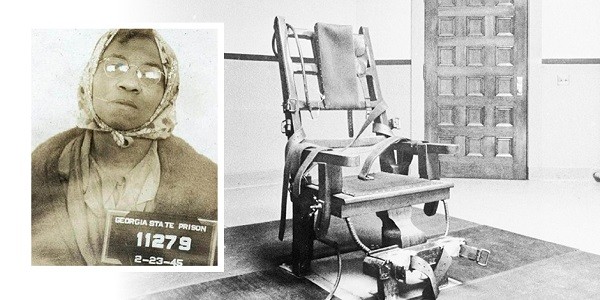Photo credits: Georgia Department of Corrections Archive
Lena Baker (pictured) was an African-American maid who suffered execution in a Georgia state prison for killing her employer, a white man named Ernest Knight.
Baker testified at her one-day trial that after working for him one day, Knight imprisoned her, enslaved her, and threatened to shoot her if she tried to escape captivity. Acting in self-defense and fearing for her life, Baker then took Knight’s gun and shot him, at some point, during her forced enslavement. However, Baker’s self-defense testimony did nothing to sway the jury, which consisted of 12 white men.
The all-white male jury convicted Baker of capital murder after her trial. She was subsequently sentenced to die by a Georgia court. On March 5, 1945, Baker (a mother of three children) was put to death in Georgia’s electric chair. Baker was the first and only woman who was ever administered death by electrocution in the state of Georgia’s history (Hicks, 2013).
At the time of her state-sponsored execution, African-Americans were not allowed to serve on juries. This law ultimately cleared the way for the unanimous guilty verdict, which led to Baker’s death in Georgia’s electric chair. After filing an appeal in the case, Baker’s court-appointed attorney dropped her as a client. She maintained her self-defense argument up until her last minutes of life.
“What I done, I did in self-defense, or I would have been killed myself,” Baker said from the electric chair before the electrode switch was pulled.
In 2005, 60 years following her unjust execution, Baker was given a full, unconditional, and posthumous pardon by the state of Georgia. On August 30, 2005, Georgia officials publicly made a proclamation to Baker’s familial descendants, including her great-nephew Roosevelt Curry (Lohr, 2005).
Curry was instrumental in the decades-long legal effort, which eventually cleared Baker’s name.
References: Hicks, J. (2013, March 05) This Day in Black History: March 5, 1945. Retrieved from https://www.bet.com/news/national/2013/03/05/this-day-in-black-history-march-5-1945.html
Lohr, K. (2005, August 26) Ga. Woman Pardoned 60 Years After Her Execution. Retrieved from https://www.npr.org/templates/story/story.php?storyId=4818124
*BlackThen.com writer/historian Victor Trammell edited and contributed to this report.





















1 Comment
She should have killed his ass.